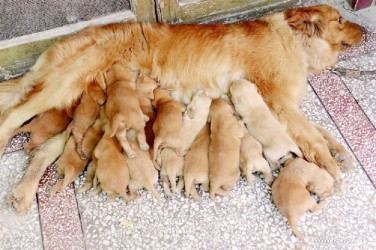Last week, we began our discussion on the care of the mother dog after she has given birth (post partum). Today we will look at her diet.
During lactation, caloric requirements increase sharply to 300 per cent of normal. At this time it is particularly  important to be sure that your dam is getting enough to eat. Otherwise, she will quickly lose weight and fail to produce enough milk to satisfy her puppies later on.
important to be sure that your dam is getting enough to eat. Otherwise, she will quickly lose weight and fail to produce enough milk to satisfy her puppies later on.
Feed a good commercial preparation (“chow”/“kibble”) earmarked for adult dogs. Some companies actually produce specialized feeds for lactating bitches. (If you can’t get the specialized feed for lactating bitches, some veterinarians suggest using a puppy chow). Name-brand dog foods are formulated to meet specific recommendations for nutritionally complete diets. They provide proteins, fats and carbohydrates, along with vitamins and minerals, in correct balance. They are quite suitable for the lactating dam – if she will eat the required amount. By the second or third week, a nursing dam eats three times her normal daily ration – or three full meals spaced throughout the day. Many veterinarians recommend supplementing the adult dog chow with meat or cottage cheese in the following proportions: 80 per cent chow (kibble) to 20 per cent meat or cottage cheese. If the ratio is exceeded a correct balance will not be obtained.
 Many bitches are likely to have inadequate calcium during nursing. A balanced vitamin-mineral supplement is most beneficial (liaise with your vet) when used during lactation. Follow the manufacturer’s recommendations in regard to dosage (quantities fed).
Many bitches are likely to have inadequate calcium during nursing. A balanced vitamin-mineral supplement is most beneficial (liaise with your vet) when used during lactation. Follow the manufacturer’s recommendations in regard to dosage (quantities fed).
Tense, over-active bitches, or those with a big litter, may require extra energy. Add three tablespoons of vegetable oil to each pound of dry dog food.
Give Vitamin B supplements to dams, especially those who are not getting the recommended added cow’s milk or those whose own milk production is impaired.
Some vets recommend for large dogs with large litters, 250mg of ascorbic acid (Vitamin C) three times a day.
I have no doubt that that which I have written above precipitates the question: “Poor people can’t afford packaged commercial dog food from companies abroad. What can poor people feed their lactating bitches?” My answer is pretty straightforward. If one cannot afford to feed the mother dog during and after the pregnancy, then one should consider spaying her, so that she can’t mate, cannot get pregnant and therefore cannot deliver puppies. That seems like common sense to me. On top of that, the GSPCA’s Animal Clinic and Shelter has a free ‘spay’ and ‘neutering’ programme. One just has to place one’s name on a list. A competent vet will perform the surgery.
However, I do recognize that other elements can be factored into the discussion. For example, the pregnancy of a bitch, the delivery of the puppies and the caring of her offspring is a huge educational tool for children. This experience cannot be garnered from a textbook. We do not wish to deprive a child’s inquisitive mind from these experiences.
So, if one cannot purchase the commercial kibble, then let’s use the next best things. Milk (preferably fresh cow’s milk), the cheapest fish meat, broken rice, and the cheapest ‘greens.’ If one has access to an abattoir, then blood and the slaughtered animals’ organs (not being used by consumers) could be purchased at a cheap price. Supplemental Vitamins (eg, B-Complex) and minerals can be purchased from the animal shops all over the country. Relative to the purchased blood, one can parcel off portions (4ozs) in plastic bags and deep freeze the bags. When the rice is being boiled, place the blood in the pot. I dare say that the pot in which the dog’s food is being cooked is quite separate and distinct from the other kitchen utensils.
If the pet owner is a vegetarian or a vegan, then protein needs will have to come from plants sources (lentils, legumes, etc).
Next week we will begin the discussion on ailments which dams encounter after giving birth to their puppies.
Please implement disease preventative measures (vaccinations, routine dewormings, monthly anti-heartworm medication, etc) and adopt-a-pet from the GSPCA’s Animal Clinic and Shelter at Robb Street and Orange Walk, if you have the wherewithal to care well for the animals. Do not stray your unwanted pets, take them to the GSPCA’s Clinic and Shelter instead. If you do not wish your pet to have puppies or kittens, you may exploit the GSPCA’s free spay and neutering programme. If you see anyone being cruel to an animal, or if you need any technical information, please get in touch with the Clinic and Shelter by calling 226-4237.




